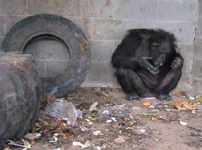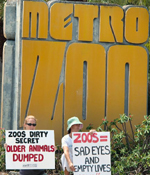 |
||
|
Media: "Chimp Dies On Way From Metrozoo To Busch Gardens" left: "Kutosha," born June 13, 1998. Died November 8, 2005. On November 8, 2005, a healthy, seven-year-old male chimpanzee named Kutosha was shipped by truck from the Miami Metrozoo to Busch Gardens Tampa Bay. Reportedly, the chimpanzee was not accompanied by any of his caregivers or staff from Miami Metrozoo. By the time the truck arrived at Busch Gardens (a four-hour trip), the young chimpanzee was not moving and had a high temperature. Busch Gardens euthanized Kutosha; a necropsy reportedly failed to determine the cause of death. ARFF believes that Kutosha is the latest victim of a far too common practice by zoos: dumping unwanted animals with little regard for their welfare. The Animal Rights Foundation of Florida and Congressman Robert Wexler have sent urgent letters to the U.S. Department of Agriculture, requesting an investigation into the young chimpanzee’s death. (click here to download ARFF's letter to the USDA.) ARFF believes that the tragic death of Kutosha likely violates the federal Animal Welfare Act which requires that animals be provided proper care in transit. In 2005, ARFF first began to call Miami Metrozoo’s animal care policies into question when investigators discovered the zoo's former chimpanzee star, Edith, languishing in a filthy underground cement pit in Texas. |
||
| Chimpanzee
Found Languishing in Filthy Pseudo-Sanctuary |
||
|
Sadly, Edith’s situation represents common practices of the zoo industry. Despite professed concern for the well-being of the animals within their confines, zoos are first and foremost businesses which benefit by imprisoning animals and putting them on display for human entertainment. To make room for cuter and therefore more profitable babies, zoos such as Miami Metrozoo frequently dispose of older surplus animals like Edith by dumping them in roadside zoos or selling them to dealers who may in turn sell them to laboratories for experiments or to canned hunt facilities, where people pay to kill the animals in an enclosed area. Recently, ARFF's Captive Exotic Animal Specialist met with the director of Metrozoo and encouraged him to adopt a policy which would ensure quality lifetime care for all of their residents. However, despite Edith’s tragic fate, Metrozoo refused to implement any of ARFF's suggestions claiming, “Miami Metrozoo is . . . not a rescue center or sanctuary.” Zoos must take responsibility for the animals they irresponsibly breed and dispose of when they no longer wow zoo patrons as they once did. ARFF is pleading with Miami Metrozoo to prevent tragedies such as Edith’s from repeating by implementing a policy that ensures quality lifetime care for all of the animals they acquire. Their failure to do so is inexcusable. |
||
| |
||
|
Press Release: Activists Kick Off Campaign Urging Metrozoo to Provide Lifetime Care for Animals. |
||
| |
||
| You Can Help! | ||
|
Please ask the Director of Miami Metrozoo to implement a lifetime care policy, ensuring that tragedies like this are not repeated: Eric
Stephens, Director |
||
1431 N. Federal Highway • Fort Lauderdale, Florida 33304 • (954) 727-ARFF


 Press
Release:
Press
Release:  During
a recent investigation of a horrific roadside zoo in Texas,
a chimpanzee named Edith was discovered in deplorable conditions.
Investigators were shocked to find Edith living in a filthy,
barren enclosure, filled with rotten food and feces, and swarming
with flies and maggots. Upon further investigation it was revealed
that Edith was owned by Bern Levine of
During
a recent investigation of a horrific roadside zoo in Texas,
a chimpanzee named Edith was discovered in deplorable conditions.
Investigators were shocked to find Edith living in a filthy,
barren enclosure, filled with rotten food and feces, and swarming
with flies and maggots. Upon further investigation it was revealed
that Edith was owned by Bern Levine of 